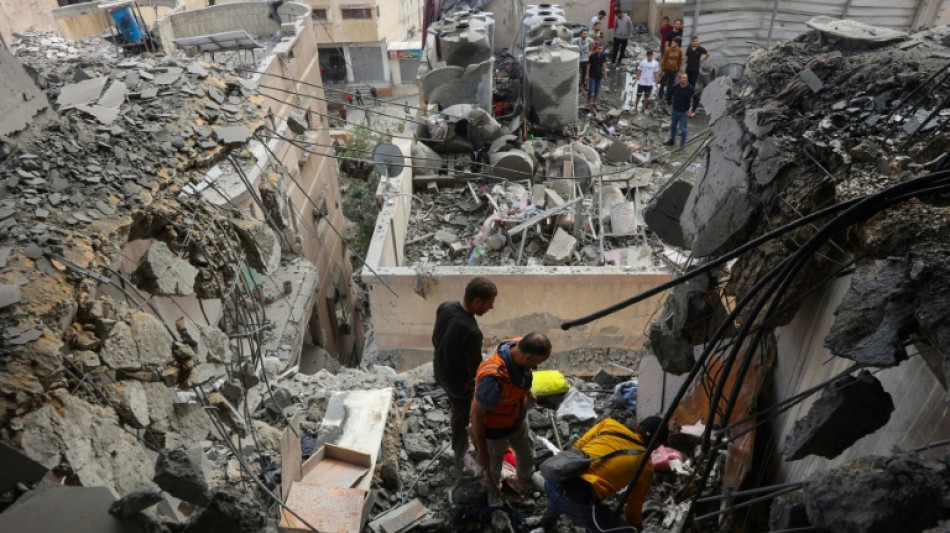
RBGPF
-0.4500

Gaza rescue teams and medics said Israeli air strikes killed at least 55 people on Thursday, as the military threatened an even larger offensive if hostages were not freed soon.
Israel resumed its military assault in the Gaza Strip on March 18, after the collapse of a two-month ceasefire that had brought a temporary halt to fighting in the blockaded Palestinian territory.
Israel's army chief, visiting troops in Gaza on Thursday, threatened to expand the offensive in Gaza if hostages seized during Hamas's October 7, 2023 attack on Israel were not released.
"If we do not see progress in the return of the hostages in the near future, we will expand our activities to a larger and more significant operation," Lieutenant General Eyal Zamir said.
The warning came as the army issued fresh evacuation orders for northern areas of Gaza ahead of a planned attack.
Earlier in the day, six members of one family -- a couple and their four children -- were killed when an air strike levelled their home in northern Gaza City, the civil defence agency said in a statement.
Nidal al-Sarafiti, a relative, said the strike happened as the family was sleeping.
"What can I say? The destruction has spared no one," he told AFP.
Nine people were killed and several wounded in another strike on a former police station in the Jabalia area of northern Gaza, according to a statement from the Indonesian hospital, where the casualties were taken.
"Everyone started running and screaming, not knowing what to do from the horror and severity of the bombing," said Abdel Qader Sabah, 23, from Jabalia.
Israel's military said it struck a Hamas "command and control centre" in the area but did not say whether it was the police station.
In another deadly attack, the bodies of 12 people were recovered after the Hajj Ali family home, also in Jabalia, was struck, the civil defence said.
Another 28 people were killed in strikes across the territory, medics and the civil defence agency reported.
They came as the Israeli military ordered Palestinians living in the northern areas of Beit Hanoun and Sheikh Zayed to evacuate ahead of an attack.
"Due to ongoing terrorist activities and sniper fire against IDF troops in the area, the IDF is intensely operating in the area," the military's Arabic-language spokesman Avichay Adraee said on X.
The United Nations has warned that Israel's expanding evacuation orders across Gaza are resulting in the "forcible transfer" of people into ever-shrinking areas.
Aid agencies estimate that the vast majority of Gaza's 2.4 million residents have been displaced at least once since the war began.
- Killed 'one by one' -
In the aftermath of a strike in Khan Yunis, AFP footage showed bodies on the ground, including those of a young woman and a boy in body bags, surrounded by grieving relatives kissing and stroking their faces.
"One by one we are getting martyred, dying in pieces," said Rania al-Jumla who lost her sister in another strike in Khan Yunis.
Since Israel resumed its military operations, at least 1,978 people have been killed in Gaza, raising the overall death toll to at least 51,355 since the war began, according to the health ministry in the Hamas-run territory.
The military acknowledged on Thursday that Israeli tank fire had killed a UN worker in the central Gaza city of Deir el-Balah last month, according to an investigation's initial findings.
It had initially denied operating in the area where a Bulgarian employee of United Nations Office for Project Services (UNOPS) was killed on March 19.
Bulgaria said it had received an "official apology" from Israel over the killing.
The findings came after the military on Sunday reported on a separate probe into the killing of 15 Palestinian emergency workers in Gaza.
It admitted that operational failures led to their deaths, and said a field commander would be dismissed.
The war was ignited by the Hamas-led October 7 attack on Israel, which resulted in the deaths of 1,218 people, mostly civilians, according to an AFP tally based on official Israeli figures.
During the attack, militants also abducted 251 people and took them to Gaza. Of those, 58 remain in captivity, including 34 the military says are dead.
Israeli officials maintain that the ongoing military campaign is essential to securing the release of the remaining hostages.
However, many families of the captives, along with thousands of protesters, have strongly criticised the authorities for pressing ahead with the offensive rather than striking a deal.
P.Benes--TPP